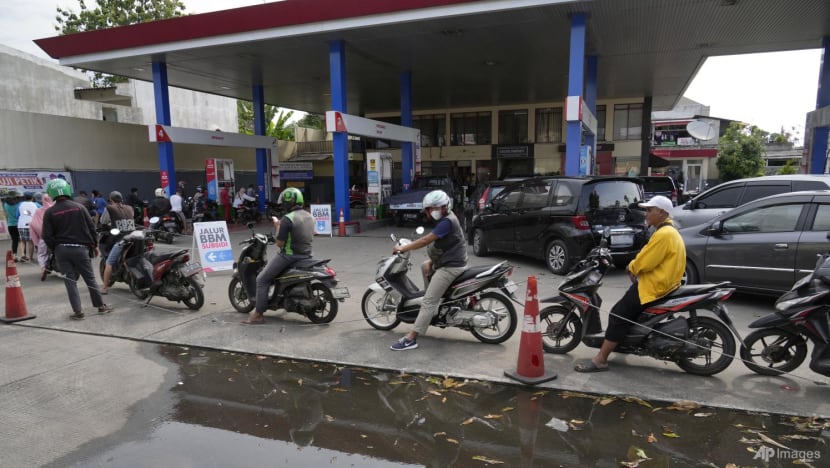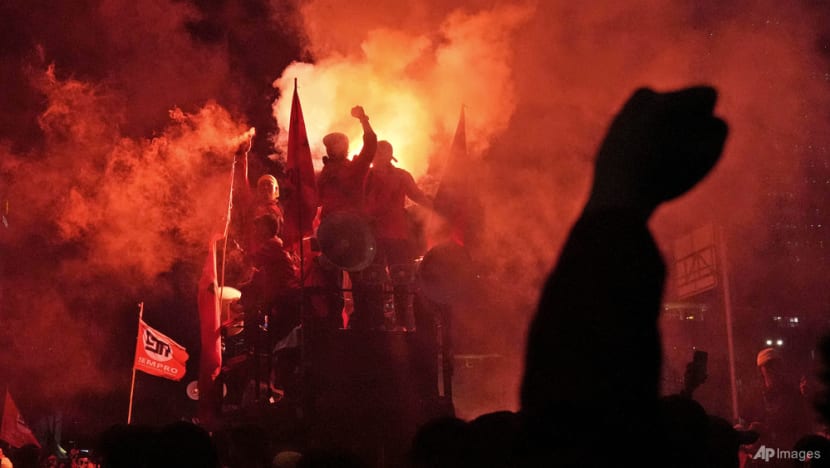Commentary: Indonesia will struggle to stay the course on hiking fuel prices
The Indonesian government argues that there is a strong case for lifting fuel subsidies – but it will be a tall order amid rising inflation, says a researcher.

Motorists queue up to fill up their tanks after the government announced an increase in fuel prices, at a gasoline station in Jakarta, Indonesia, Sep 3, 2022. (AP Photo/Tatan Syuflana)
SINGAPORE: Buffeted by higher global fuel prices, the Indonesian government has increased fuel prices at the petrol pump by 30 per cent. The government has justified the increases as a method to reduce the strain on the country’s coffers, which have been caused by ballooning subsidies that keep petrol prices lower.
Given the widespread dependence on subsidised fuel in a generally low-income society, there is apprehension about the significant impact of rising fuel prices on household incomes. In addition to the 30 per cent rise in petrol pump prices, the government also announced rationing of the cheaper, lower grade petrol to some consumers, including both ride-hailing drivers and middle-class consumers.
However, this now seems to have been delayed. The price of subsidised Pertalite gasoline was raised from 7,650 rupiah (US$0.50) a litre to 10,000 rupiah, while that of subsidised Solar diesel rose from 5,150 rupiah a litre to 6,800 rupiah.
Besides revising the prices for Pertalite and Solar, Pertamina – the national oil firm – also announced the increase of unsubsidised Pertamax, the highest petrol grade, from 12,000 rupiah a litre to 14,500 rupiah.
A POLITICALLY SENSITIVE MATTER
The government’s rationale for lifting fuel subsidies is strong. Petrol prices in Indonesia have not risen since 2014 while international prices have risen dramatically in 2022. The result is that government subsidies paid to keep prices lower have trebled from what was anticipated in Indonesia’s budget. It now stands at US$47.4 billion.
But the price increases are occurring at a time when inflation in Indonesia, at 4.94 per cent, is the highest it has been since 2015. The Minister of Finance, Sri Mulyani, remains confident that it can be restrained – to an extent.
Rises in prices at the petrol pump are extremely politically sensitive in Indonesia as they are perceived to fuel inflation in a generally low-income society. Demonstrations have continued almost daily around Indonesia.

They are largely spearheaded, as usual, by students, although this time there have also been angry demonstrations by drivers working through platform application services firms such as GoCar and Grab. These drivers, while perhaps having more hours of work than prior to the use of apps, must share their income with the firms and also pay for petrol and repairs themselves.
The fuel price rises compound matters, since Indonesia has a minimal public transport system which is complemented by motorbike taxis and ride-hailing drivers, especially in towns and cities outside Jakarta. Disruption of these services through demonstrations and an increase in transport prices will hit the middle class, and in particular lower-middle class consumers.
OPPOSITION TO PRICE HIKES FROM POLITICAL PARTIES
Apart from the ongoing student demonstrations, which have been organised by both conservative and progressive student groups, the rhetoric of political parties outside of the formal government coalition has been oppositional.
On Sep 6, the Justice and Welfare Party (PKS) staged a walk-out of a parliamentary sitting protesting the price rises. Student groups connected to the PKS in several cities have also staged protests since.
The larger Demokrat Party, now headed by Agus Harimurti Yudhoyono (son of former president Susilo Bambang Yudhoyono), has also called on its cadres to join protests. There are no signs yet of any cracks in support of the policy from within the governing coalition.
On Sep 9, the new Labour Party, still struggling to obtain electoral verification, threatened to mobilise millions of workers against the price hike.
While the Labour Party has yet to deliver on any of its previous threats of major mobilisations, its oppositional rhetoric adds to the spreading atmosphere of unrest. Whatever their eventual size, it is likely that the unions associated with this Party will hold some demonstrations.
Unions in another coalition, called Gebrak, also demonstrated on Sep 13 and are planning more protests. The leading union in this coalition of labour, students and civil society groups is the Congress of Indonesian Trade Union Alliances (KASBI), which is not affiliated with the Labour Party.
The Gebrak alliance, which includes other smaller unions as well as student and human rights groups, has been a significant actor in civil society protests against government policies such as the Jobs Creation (Omnibus) Law, especially in Jakarta.
On Sep 13, they called for, among other things, the cancellation of the fuel price increases, the repeal of the Omnibus Law and rejected the revisions proposed to the new Criminal Code.
MORE UNREST WILL ENSUE
There have been public protests about rising fuel prices almost every time they have been made, including during the Yudhohyono government. This time, however, the opposition arrayed against the government on the issue has more political buckshot. The continuing demonstrations number up to 10 in Jakarta on a single day.
This time actors in the mainstream, such as the Demokrat Party, the PKS and the Labour Party, are also articulating oppositional rhetoric, however opportunistic that may be. There is also the potential for serious disruption of public transportation through demonstrations by ride-hailing drivers, who now number around 3 million.
The government hopes to dampen the unrest. It has promised cash payments of 600,000 rupiah to low-income citizens. More tellingly, the government backtracked almost immediately when on Apr 13, it announced that rationing of Pertalite will be delayed while the government “makes studies”. The Minister for Labour Affairs has also called for wages to be increased.
But it will be a tall order for the government to ride through the current storm, particularly if civil society demonstrations continue while some mainstream actors sustain their opposition rhetoric. With inflation rising, more political unrest will ensue, which will in turn destabilise preparations for the 2024 elections.
Granted, the current unrest remains fragmented and without political leadership. But if left uncontrolled, the government will have its hands full trying to bring the political temperature down.
Max Lane is Visiting Senior Fellow at the ISEAS-Yusof Ishak Institute. This commentary first appeared on the ISEAS-Yusof Ishak Institute’s blog, Fulcrum.
















